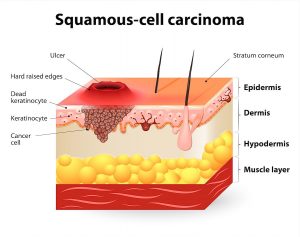Have you had the diagnosis of Squamous Cell Carcinoma? Do you have a non-healing sore or a red scaly patch?
Squamous cell carcinoma is the second most common type of skin cancer. It is thought to occur via cumulative sun exposure over time. It can develop in many different areas of the skin as well as mouth, esophagus, and genitalia. It may appear on the skin as a non-healing wound, or a rapidly growing nodule resembling a wart. Squamous cell carcinoma can be red or pink in color. It can be a raised papule or a large red scaly patch. Squamous cell carcinoma can be an aggressive type of skin cancer. Sometimes it can grow and travel to other parts of the body, such as lymphoma nodes or distant organs. This process is called metastasis. Risk factors for SCC include: fair complexion with blond or auburn hair, green or blue eyes, a history of tanning bed use or severe sun burns, problems with a weakened immune system (transplant patient, cancer, HIV), smoking, or radiation therapy. SCC on locations such as the ears, lips, scalp, or genitals may have increased risk of metastasis.

SCCs are most commonly found on areas that get the most sun exposure such as face, ears, lips, back of the hands, arms, and legs. They however may also appear on areas that do not see the sun such as the inside of the mouth or on the genitals. UV rays emitted by the sun, tanning bed or other indoor tanning devices cause damage skin cells. SCCs typically begin as a dry, scaly, rough precancerous growth called an Actinic Keratosis (AK). People of all skin colors can get SCC but it is more common in Caucasians. As we age our skin naturally has more exposure to the sun putting us at a higher risk of developing skin cancer.
Prevention
Squamous cell carcinomas can be prevented by avoiding sun during peak hours 10am- 4pm, wearing sunscreen daily with repeat applications while outdoors, and/ or wearing protective clothing. Preventative skin exams are recommended to help diagnose and treat these areas.
Risk Factors:
- Light Color Skin
- Blue, Green, Grey Eyes
- Blonde or red hair
- Inability to tan
- Use of tanning beds or sunlamps
- Exposure to cancer-causing chemicals
- Tobacco Use
- Blistering sunburns
- Large amount of time outdoors without sun screen
- Previous diagnosis with Actinic Keratosis
- Suppressed immune system
- Received an organ transplant
- Infected with HPV
- Received acne treatment via x-ray in the 1940's
Cure / Therapy
Early detection is key. Superficial or early squamous cell carcinoma can sometimes be treated with topical chemotherapy creams such as 5-fluorouracil or Imiquimod.
- Surgical removal: excision or Mohs Micrographic Surgery
- Electrodessication and Curettage [ED &C]: superficial squamous cell carcinomas can be cured with a superficial treatment which scrapes out the skin cancer and cauterizes the base.
Schedule a Skin Cancer Screening
If you have concerns with the health of your skin or need further information on Skin Cancer types, treatment, or prevention, please feel welcome to call High Valley Dermatology.




